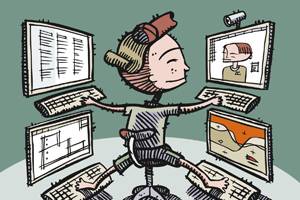YOUNG: “You have distraction!”

YOUNG: “You have distraction!”
September 3, 2008
I hope you read this. Yes, you, with the strawberry-blond ponytail and Greek sweatshirt, sitting in my Abnormal Psychology lecture. Don’t worry, I believe your opposable thumbs really do work — there’s no need to text any more to exhibit their skills.
Furthermore, I hope at least one of those texts went to your Facebook friend, who I watched drink herself sick in your 60-photo slideshow. Nothing screams classy like bowing to the porcelain throne. Thank goodness you used your trendy black MacBook so you could conveniently transition from notes to the Internet in one easy keystroke.
Unfortunately, technology, which once seemed so progressive, is beginning to inhibit learning, as more and more students decide to techno-multitask their way through lectures.
Nationwide, colleges and universities are beginning to take action to limit our Internet addiction.
At the University of Chicago law school, for example, Internet access has been removed from most classrooms to combat this growing problem.
In other circumstances, individual professors are taking action to re-engage techno-addicted students.
David Cole, professor of Law at the Georgetown University Law Center, banned laptops from his classroom after realizing students were physically present in the classroom, but mentally absent from lectures.
Here at Iowa State, Barbara Mack, associate professor with the Greenlee School of Journalism and Communication, asks that students often clear their desks entirely during class, forcing them to engage in discussion.
Clearly, this technology issue is raising a bit of a fuss — but how hard can it be to go without our gadgets?
With Internet addiction emerging as a new clinical disorder, according to research by Kimberly S. Young, of the University of Pittsburgh, and cell phone addictions on the rise, our generation may have a larger problem than we all realize.
Even while typing this column, I have already checked my e-mail, chatted on Facebook and fielded two calls regarding my plans for this evening.
The problem with all of this technological advancement is our inability to remove ourselves from its influence.
Even if we, as students, choose not to bring our laptops to class and to put our cell phones on silent, we cannot escape technology.
Enter the pet peeve of many a student: power point slides. Forgot to print them off? Good luck keeping up with the lecture.
Certainly, these handy visual aides can be convenient, but often provide very little interaction between student and professor, course material and thought.
Rather than rephrasing information into our own thoughts, students are left scrambling to fill in blanks. With little time to actually process information, we begin to suffer from intellectual bulimia — spewing notes onto pages with little time for digestion.
Additionally, professors seem to rely increasingly on these handy, pre-saved teaching aids, raising question as to how much time was actually put into this particular course.
The exact same lecture slides could be used year after year, with little adjustment for student style or updated information.
To be fair, professors in today’s university setting may not have excess time to devote to designing an engaging lecture.
According to the ISU Web site, promotion or tenure for professors are, “based primarily on evidence of scholarship in the faculty member’s teaching, research/creative activities, and/or extension/professional practice.”
With all of the research, creative activities and professional practice expected for promotion, delivering engaging lectures may not be a high priority, especially if students will most likely surf the Internet anyway.
Perhaps, if we, as students, choose to take an interest in our education and put away our laptops, lecture styles may improve.
Until then, you Internet-surfing students, please visit more interesting sites — as an avid viewer of your screen, I’m a bit bored with you and your friends’ Facebook profiles.
— Julie Young is a senior in journalism and mass communication from Indianola.






